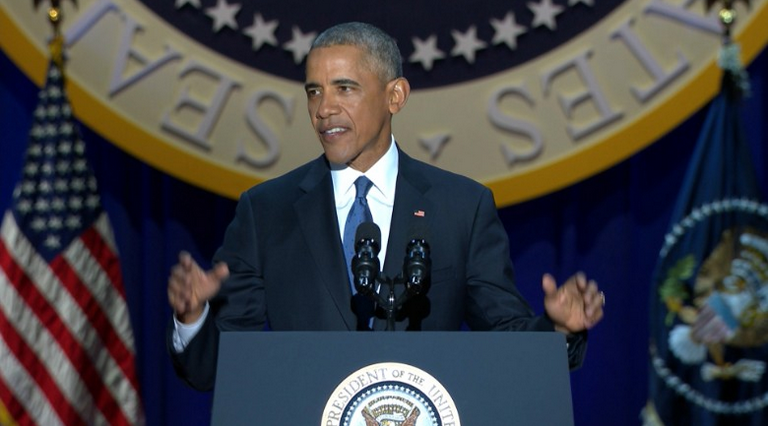
Barack Obama gave his farewell address this Wednesday Beijing time, providing the world with his most comprehensive and well-received commentary on his term in office. Obama’s heavy “self-praise” is certainly understandable under the American system.
The majority of the achievements Obama listed are highly controversial. That America’s economic performance is better than other major Western countries is the only achievement that can be proven by solid data. American gross domestic product per capita has risen, the unemployment rate has dropped, and the stock market has undergone one of its longest bull markets in history.
However, the income gap in America continues to grow as the economy turns around, and the people’s sense of gain is low. There is much discussion in the middle class of the “sinking” of its status, and because people did not clearly perceive their situation, Trump was given the opportunity to win the election.
Of the things Obama considers a part of his political legacy, such as health care reform, the majority of those accomplishments are at risk of being discarded under Trump’s administration. It’s possible that in the end, Obama will leave nothing behind, with those succeeding him scrubbing clean any mark of his time in office.
When someone leaves their post, the Chinese are accustomed to saying a few kind words about that person. If we can give such treatment to someone, we can still find a few strengths demonstrated by the outgoing American president.
First of all, Obama worked hard. In eight years, his hair has turned grey. He devoted his all to domestic health care reform, but there were impasses as well. For instance, gun control was not something he could achieve; we can only say that he gave the issue his great effort.
On the foreign policy front, he was subjected to significant controversy. But overall, he was not as brash as George W. Bush, especially as he was much more cautious about pulling the trigger. Receiving the Nobel Peace Prize was incredibly questionable, but he was the most peaceful of all the recent American presidents; his term saw no new wars. America did partake in the military assault on Libya’s Gaddafi, but that was not really spearheaded by Washington.
Obama was there for the “Arab Spring” in its entirety, wherein it could be said that his performance always angered one person or another. Regarding the conflict in Syria, the White House provided a solution to the thorny reality of the situation on the ground, dragging out the Syrian civil war for six years, allowing the rise of the Islamic State and a flood of refugees. Today Washington’s control in the Middle East is all the more weak. Obama’s Middle East policies should be seen as a failure.
Obama’s pivot to Asia strategy is commonly seen as unsuccessful. The problem in the South China Seas has aggravated mutual suspicion between the U.S. and China, and in the end, American influence in the South China Seas region has also fallen.
Yet, Obama’s tactics in pushing the pivot to Asia were not at all extremist, and thus, he avoided the emergence of a more terrible situation in Sino-American relations over the South China Sea. American and Chinese leaders met with historically high frequency over the whole of the Obama administration, and the institutionalization of mechanisms for Chinese-American intercourse and interaction has shown progress. As the relations between the two great powers grow more complex, they are also becoming more familiar. It is tenable to appraise relations now as having taken another step forward in development.
At the very least, there are four major areas of foreign relations that worsened while Obama was in office, namely, American relations with the Saudis, Turkey, the Philippines and Russia.
The undulation of Russo-American relations does not completely adhere to logic. Relations over the last eight years were at first warm but are now cool, with Obama at first warmly resetting the relationship, and now having completely fallen out with Putin. Yet Trump has suggested a new inclination to reignite the process for a Russian and American friendship. In other words, between Russia and America there are issues Obama considers irreconcilable which Trump does not see as particularly important. So will such a situation arise between America and other countries as well?
In general, Obama seems to be a pretty great person, having appeared more moderate and less extreme compared to George W. Bush and Bill Clinton. He was the president everyone more or less expected. Although he did not display any particular leadership ability, he was not like the trigger-finger Bush who rushed toward calamity.
After Obama, someone completely different and previously obsessed with the spotlight will enter the White House. Whatever Trump does, each man will be the measure against which the other is compared.

Leave a Reply
You must be logged in to post a comment.